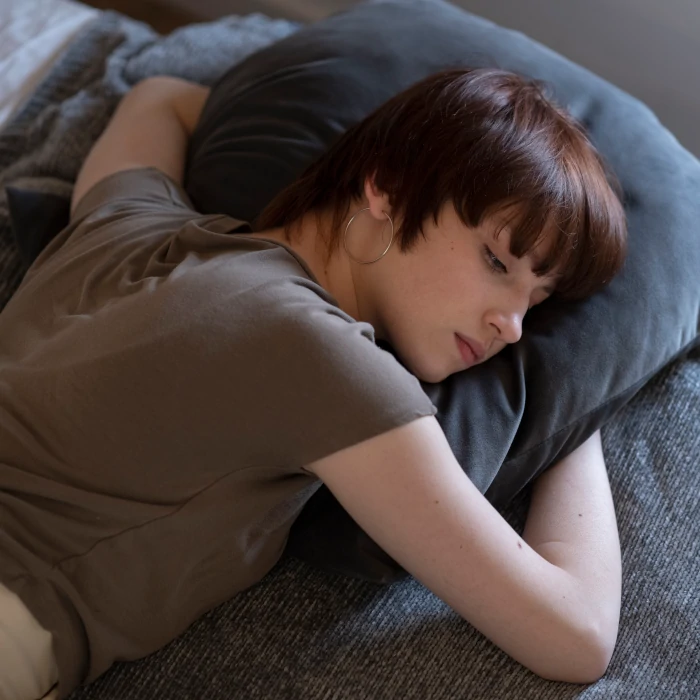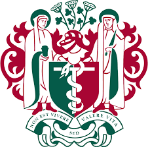Depression Treatment
Feeling overwhelmed, exhausted, or disconnected from the things you used to love? Do you find it difficult to get through the day, weighed down by sadness, loneliness, or a constant lack of motivation? Are night time ruminations and negative thoughts interfering with your sleep? If depression is making life feel unbearable, you’re not alone.

Depression treatment from a leading specialist
Depression is a common mental health condition that can happen to anyone. Depression causes persistent feelings of sadness, low mood, loss of interest or pleasure in daily activities, and decreased energy or motivation. It can affect sleep, appetite, concentration, and self-esteem, often making everyday life feel like a struggle. Depression varies in severity, but it’s important to remember it’s treatable, and support is available.

Signs you could be struggling with Depression
Persistent sadness or low mood
Persistent sadness or low mood is more than just feeling down occasionally; it’s a continuous sense of unhappiness or emptiness that stays with you day after day, even without an obvious reason. You might feel as though there’s a heavy weight pulling you down, making it hard to enjoy things you used to love or find motivation for everyday tasks. If you’ve noticed this feeling lasting for weeks or months and it’s impacting your daily life, you may be experiencing depression.
Loss of interest or pleasure in activities once enjoyed
Loss of interest or pleasure, also known as anhedonia, is when activities you once enjoyed no longer bring you happiness or satisfaction. You might find yourself avoiding hobbies, social gatherings, or everyday tasks you used to look forward to. Even things like watching your favourite shows, spending time with loved ones, or going out might now feel empty or meaningless. If you’re experiencing this change, it’s a common symptom of depression — not a personal failure.
Feelings of hopelessness or worthlessness
Feelings of hopelessness or worthlessness can make it seem like things will never get better, or that you don’t matter, like no matter what you do, nothing will change. You might feel stuck, as if there’s no point in trying or that you’re a burden to others. These thoughts can be overwhelming and make everyday life feel like a struggle. It’s important to know that these feelings are common in depression and don’t reflect the truth about your value or your future.
Fatigue and decreased energy
Fatigue and decreased energy in depression can feel like you’re constantly drained, no matter how much rest you get. Simple tasks—like getting out of bed, taking a shower, or making a meal—can feel exhausting or even impossible. It’s more than just being tired after a long day; it’s a deep, ongoing lack of energy that doesn’t seem to go away. This kind of fatigue is a common part of depression, and it can make even small things feel like big challenges. You’re not lazy or weak, this is a real symptom, and with the right support, it can get better.
Changes in appetite or weight
When you’re dealing with depression, your appetite and weight can change in ways that feel confusing or unexpected. Some people lose interest in food, they might forget to eat, feel too tired to prepare meals, or feel like nothing tastes good anymore. This can lead to weight loss without even trying. Others might eat more than usual, using food as a way to cope with difficult feelings, which can lead to weight gain. Both of these changes are common symptoms of depression, and they’re not something to be ashamed of. With help and support, your appetite and energy around food can return to a healthier balance.
Sleep disturbances (insomnia or oversleeping)
Depression can really affect your sleep, and it’s different for everyone. You might find it hard to fall asleep or keep waking up during the night, leaving you feeling tired and unrested in the morning. Some people wake up much earlier than they want to and can’t get back to sleep. On the other hand, some people with depression sleep much more than usual but still feel exhausted all the time. Whether you’re sleeping too little or too much, these changes are common symptoms of depression, and getting the right help can make a big difference in getting your sleep back on track.
Difficulty concentrating or making decisions
When you’re experiencing depression, it can be really hard to concentrate or make decisions, even simple ones. You might find your mind wandering, feel easily distracted, or struggle to focus on things like reading, watching TV, or following a conversation. Making choices, even small ones like what to eat or what to wear, can feel overwhelming or confusing. It’s like your brain is foggy or slowed down, and it can be frustrating. This is a common symptom of depression, and with support, your ability to think clearly and make decisions can improve.
Reduced motivation
Reduced motivation in depression can feel like you just don’t have the drive or energy to do things, even tasks you know are important or things you used to enjoy. Getting started can feel really hard, and you might find yourself putting things off or avoiding them altogether, not because you don’t care, but because it feels too exhausting or pointless. This lack of motivation isn’t laziness, it’s a real and common symptom of depression.
Loss of interest in sex (low libido)
Depression can affect many parts of your life, including your sex drive. You might notice a loss of interest in sex, find it harder to become aroused, maintain arousal, or enjoy intimacy the way you used to. This is known as sexual dysfunction, and can affect between 25% to 75% of people with depression. It’s not about you or your relationship, depression often lowers energy, affects mood, and changes how your body responds, which can all lead to reduced sexual desire or performance. These changes can feel frustrating or upsetting, but you’re not alone, and they can improve with the right support and treatment.
Thoughts of death or suicide
When someone is struggling with depression, it can feel so overwhelming and painful that they may start having thoughts about death or wondering if life is worth living. Some people might think about wanting to escape the pain or feel like others would be better off without them. These thoughts can be frightening, but they’re more common than many people realise, and they’re a sign that you need support, not that you’ve failed. If you’re having these thoughts, you don’t have to face them alone. Talking to someone you trust or reaching out for help can make a big difference. There is hope, and things can get better with the right support.
Treatment for Depression with Dr. Dipesh Mistry, depression specialist
Dr Mistry’s experience working in a complex depression anxiety and trauma service, combined with his expertise in sleep disorders means he is well-positioned to take a comprehensive approach for the treatment of depression, including depression that is occurring alongside other mental health conditions.
Dr Mistry can also leverage his experience working in a busy psychiatry liaison service in University College London Hospital to support patients who have developed depression in the context of a medical condition.

Assessment with Dr Mistry
Dr Mistry can offer you an assessment of your depression in a relaxed setting at one of his central London clinics. This will be a friendly, private conversation where Dr Mistry will ask questions to gently explore the nature and severity of your depressive symptoms, as well as looking at how this may be impacting on your day-to-day functioning and quality of life.
Dr Mistry will ask questions about your physical health, lifestyle, medications you are taking in addition to looking at potential triggers for your depression. The information gathered will be carefully considered by Dr Mistry to formulate a comprehensive treatment plan for your depression.
Different types of depressive disorders Dr Dipesh Mistry can treat:
- Mild, moderate and severe (major) depression
- Recurrent depression
- Psychotic depression
- Postpartum depression
- Seasonal affective disorder
- Dysthymia
- Mixed depression and anxiety
The link between depression and sleep disturbance
Links between depression and sleep disturbance have been documented in ancient medical literature.
In the Charaka Samhita, an authoritative work on Ayurveda dating back over 2,000 years, sleep (referred to as Nidra) is considered essential for maintaining physical and mental health. Mental distress such as worry, anxiety, fear, grief and excessive thinking is identified as a primary cause of sleep disturbance, referred to as Anidra.
Robert Burton’s book, the Anatomy of Melancholy first published in 1621, commented that ancient Greek physicians observed that melancholic individuals struggled to fall asleep, stay asleep and woke up too early in the morning.
Emil Kraepelin, regarded as the founder of modern psychiatry hypothesised that different types of sleeping difficulties were linked to different subtypes of depression. He proposed that difficulties falling asleep (sleep onset) were associated with “neurotic” depression, and difficulties staying asleep and early morning awakenings were linked to “endogenous” depression.
What does this mean for me if I have depression?
Sleep disturbance was previously thought to occur secondary to depression.
It was later found that that a number of sleep disorders at baseline were linked to subsequent depression. In other words, sleep disturbance itself is a risk factor for developing depression and could be regarded as a predictive prodromal symptom for depression.
Recent research indicates that there is a bi-directional relationship between depression and sleep disturbance. Unresolved sleeping difficulties pose a greater risk of relapse and recurrence of depression.
Despite this, sleep specific treatment plans do not currently seem to be routinely considered for patients seeking support for depression.
Depression can result in getting less sleep overall, and the development of insomnia. However, in some people depression can result in too much sleep, a condition known as hypersomnia.
How does sleep change for people who have depression?
Polysomnography (PSG) findings show that people with severe depression have reduced sleep efficiency and altered sleep continuity, in the form of prolonged sleep onset and difficulties with sleep maintenance. This results in a reduction in total sleep time. People experiencing depression also have less slow-wave sleep (deep sleep), increased stage 1 sleep, as well as disturbances in REM (rapid eye movement) sleep.

Can antidepressants affect sleep?
Antidepressant medications can alter sleep stages and this can be measured with overnight sleep studies (PSG). In particular, most antidepressants suppress REM sleep, although there are a few exceptions. REM sleep is important for memory consolidation, emotional regulation and physical health. Certain classes of antidepressant medications, such as SSRIs (selective serotonin reuptake inhibitors) may cause sleep continuity to deteriorate, resulting in patients developing symptoms of insomnia.
Some people can recover from depression without taking antidepressants.

Which sleep conditions are commonly linked with depression?
Insomnia
Insomnia has been found to double the risk of developing depression and has been identified as an independent predictor for depression.
Hypersomnia
Hypersomnia, characterised by excessive sleepiness or prolonged sleep duration is estimated to affect 25% of patients with severe (major) depression.
Obstructive sleep apnoea
Obstructive sleep apnoea and depression frequently occur together, and are believed to have a bidirectional relationship.
Restless leg syndrome
Restless leg syndrome, a condition that is twice is likely to develop in women compared to men, has been associated with a 2-4 fold increase in the risk of depression.
Evening chronotype
An evening chronotype has been linked with more severe mood symptoms, although larger studies are needed to replicate these findings.
It is important to remember that depression, insomnia, and other sleep disorders can occur independently of each other.
Dr Mistry’s approach to depression therapy
Physical health: Treating depression means caring for your mind and your body. Dr Mistry takes a whole person approach and this will include an assessment of your physical health, and consideration of other important factors including nutrition, energy levels, exercise and underlying health conditions. Addressing and optimising these important factors play a powerful role in lifting depression and building a stronger foundation for a lasting recovery.
Lifestyle interventions: Dr Mistry can provide advice on a wide range of easily implemented lifestyle tweaks that can facilitate and speed up a recovery from depression.
Sleep management: Sleep and mood are deeply connected. If you are struggling with depression, optimising your sleep is a powerful lever for securing your recovery. Dr Mistry can offer a comprehensive assessment of your sleep along with treatment recommendations, to enhance your management plan for depression.
Medications: You do not have to choose between feeling better and sleeping well. Worried that antidepressant medications might interfere with your sleep? The good news is you have options. Dr Mistry can offer antidepressant treatment that supports your mental health without compromising your sleep.
Psychological therapy: Dr Mistry recognises that no two people experience depression in the same way. Dr Mistry can offer advice on a wide range of professionally led psychological interventions that are tailored to your specific needs and aligned to your goals. Dr Mistry can also provide his patients with resources for self-administered psychological support.
Close follow-up: Starting treatment for depression is a powerful first step, but staying on track is just as important. That’s why, once your treatment plan is in motion, Dr Mistry will provide regular follow-up and ongoing support to ensure that you stay on track to secure a recovery from depression.
Your happiness, wellbeing and ability to get the most out of your life matters. Reach out to Dr Mistry and take the first step towards reclaiming your quality of life.
Why choose Dr Mistry?
Expertise you can trust: Dr Mistry brings together years of medical training and a wide range of clinical experience giving him a deep understanding of how depression affects your mind and your body.
Better sleep, better mood: Choosing a doctor with working knowledge of sleep medicine can make a real difference in your recovery. Dr Mistry considers the impact of commonly prescribed antidepressant medications on your sleep, to enhance the treatment plan for your depression.
Personalised treatment plans: Dr Mistry takes the time to truly understand how depression has affected you, and leverages this information to create a treatment plan tailored to your specific needs.
Convenience and flexibility: By offering options for in person or virtual consultations, Dr Mistry makes it easier to fit treatment into your life so you can focus on recovering without any added stress.

Where to find us
Dr Mistry has two central London locations you are able to visit.
Ankha,
17 Elystan Street
Chelsea
SW3 3NT
150 Harley Street
London
W1G 7LQ
Online consultations
We also offer convenient online consultations for those who prefer to meet with our insomnia specialists from the comfort of their own homes.









